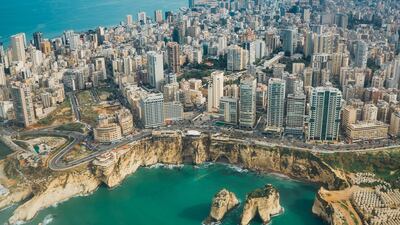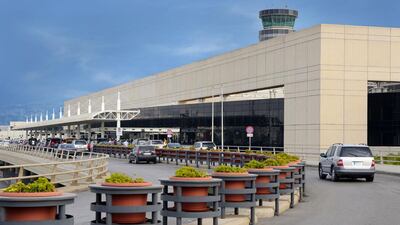After more than three months of being closed to travellers, Lebanon is opening up, with the airport in Beirut set to resume commercial flights on Wednesday, July 1.
Beirut - Rafic Hariri International Airport will reopen to travellers with a reduced capacity of 2,000 passengers per day, about 10 per cent of regular passenger traffic at the airport. This should cut down the lengthy queues for which the airport has long been known for. To help with this, social-distancing stickers and signs have been installed throughout the airport and disinfection tunnels have also been set up at the entrance.
What rules are in place for arrivals?
Visitors coming into the country fall into one of two categories – those coming from countries where Polymerase chain reaction (PCR) testing is available, and those coming from destinations where it is not.
The first group, which includes the UAE, must have a PCR test before flying to Lebanon. These travellers then have to show the negative results of a test that's been taken within 96 hours before landing in Beirut. Travellers will take another test at the airport, which will be paid for by the airlines operating flights.
The second group consists of visitors from countries that are not offering PCR testing. Travellers coming from these destinations will need to take a Covid-19 test upon landing in Lebanon, paid for by the airline operating their flight. They will then self-isolate for 72 hours before taking a second test, which costs $100 (Dh367), and will be paid for by travellers.
Destinations in category 1:
Gulf: Abu Dhabi, Dammam, Dubai, Jeddah, Madinah, Riyadh
Middle East: Amman, Baghdad, Basra, Najaf, Cairo, Erbil
Europe: Athens, Brussels, Frankfurt, Geneva, Istanbul, Larnaca, London, Paris
Africa: Accra, Lagos
Destinations in category 2:
Gulf: Doha, Kuwait
Europe: Copenhagen, Yerevan, Milan, Rome
Africa: Abidjan

All tourists from all destinations need travel insurance that will cover the expense of coronavirus medical treatment if any tests come back positive or a traveller develops symptoms while visiting Lebanon.
Travellers must also fill in an online health declaration form before flying to Beirut. The electronic receipt provided by the Ministry of Health must be presented upon arrival in the country.
Which airlines are flying to Lebanon?

Several airlines are flying direct from the UAE to Beirut and the journey time is under four hours.
Emirates is resuming flights from Dubai to Beirut on Wednesday, July 1, and will operate four flights per week. Economy return fares start from Dh1,995.
Flydubai will restart flights to Beirut from Dubai International Airport. The first scheduled flight will leave Dubai on Thursday, July 2, and the airline will operate two flights per week (Thursday and Saturday). Fares start from Dh1,948 for economy class both ways.
From Sharjah, Air Arabia is flying to Beirut with the first flight leaving on Wednesday, July 8. The airline will fly twice a week to the Lebanese capital (Wednesday and Friday), and return fares start from Dh2,165.
Middle East Airlines are also flying daily from Dubai to Beirut with flights resuming on Wednesday, July 1, and the lowest available return fare is Dh1,625.
Are hotels in Lebanon open?

Some hotels in Lebanon have closed temporarily during the Covid-19 pandemic, so find out which ones are operating. This is especially true in rural areas of the country or at smaller, family-run hotels, which may not have websites or social media pages to keep guests updated.
In Beirut, many hotels have reopened to travellers with enhanced safety measures in place.
Gefinor Rotana and Raouche Arjaan by Rotana are both welcoming guests, with updated coronavirus safety procedures. These include dedicated isolation rooms for any guests that develop symptoms, contactless Guest Service directories and take-away food services from restaurants.
The stylish Le Gray Beirut in the heart of the city has reopened, with upgraded hygiene measures. These include restricted numbers at the hotel's renowned rooftop pool and socially distanced tables in the hotel restaurants and terrace.
Four Seasons Hotel Beirut has also reopened with new health standards that include temperature screening on arrival, socially-distanced seating in common areas and face masks required to be worn throughout the hotel.
Other hotels, such as the renowned Le Bristol, have been forced to close permanently due to the pandemic.
What you can and can’t do in Lebanon

There’s a number of measures in place across the country to limit the spread of coronavirus. These are changing on a regular basis so it’s important that travellers pay attention to local news sources when visiting. Areas and neighbourhoods that have a high number of cases may have more restrictions than less affected areas, so if you're moving around the country, be sure to check what applies in each destination.
Across Lebanon, face masks must be worn when stepping out of your hotel room. Social-distancing guidelines are in place in all public areas.
According to current restrictions, large gatherings are banned and movement is limited from midnight until 5am.
There’s also restrictions on the number of people travelling in a car or taxi, so if you're a big group, you may need to book separate transfers from the airport to hotel.

Theatres and cinemas remain closed, but across the country markets, restaurants, beaches, swimming pools and nightclubs have started to reopen. It’s best to call ahead and check if places are open before visiting, and many restaurants now require advance booking.
If you want to hit the hills, the Lebanon Mountain Trail has reopened to those looking to get walking. Updated safety guidelines for hikers include bringing your own gear, packing your own food and avoiding routes that have become crowded, even if they are officially open to the public.



